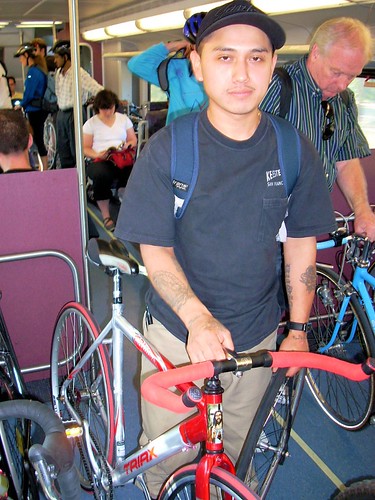It's a junky, ugly road bike, but if you're looking for something cheap and functional it's not a bad bike to commute on. The only problem is that the components are cheap junk. They're difficult to keep adjusted, but if the components fail or fall apart, the dérailleur hanger is long and nearly horizontal, making the Triax Crimson road frame a decent platform for a fixed conversion on the cheap.

Carlos here converted his Triax bicycle to fixed gear. I love the Jesus picture in place of the headbadge on this bike.
Because the components on a Triax are so junky, converting to fixed is probably a good idea. Upgrading the wheels and tires and replacing the drop bars with those bullhorns makes the bike a little cooler, though it's probably overkill. Those bars are possibly worth more than the frame. The wheels certainly are. Carlos rides brakeless with flat platform pedals.
Carlos doesn't speak English; I was surprised to see a recent immigrant Latino riding a fixed gear bike. In the Bay Area, many "fakengers" (like me) are comfortable white people with steady income.
Carlos obviously has some pride in the bike and he told me he built it up himself. I imagine the frame was probably acquired used with non-working components.
Those in the San Francisco Bay Area will recognize this photo was taken on a Caltrain bike car during the evening commute. Almost every person in this photo is a bike commuter.
3 comments:
Sounds like he's one of the "invisible riders" liek Bicycling magazine's article described (almost made3 me subscribe, I tell ya)... CICLE snagged it at http://www.cicle.org/cicle_content/pivot/entry.php?id=809 tho' sometimes linking doesn't work (but if you google cicle and then do "invisible" search on their site, and look for "L.A.'s invisible riders" you'll find the article).
It's worth reading regular-like for that perspective. When it came out it was discussed and some people did some eyerolling about how those eople would buy cars if theyy could - which is still viewing it through "those people" lenses because my guess is there isn't a lot of time wasted on thinking "if I could, I'd get a car" (especially if licenses would have their own legal problems).
Fixies just kinda befuddle me. Since I can only engage my brain in one thing at a time, one-ness with a machine is an impossible dream...
You're right, Sue. I've long recognized that Latinos probably make up the majority of cyclists in America; I got the Denver area Bike To Work team to begin Spanish-language outreach, and the Silicon Valley Bicycle Coalition is now thinking about Spanish language outreach after I suggested it. I have the print edition of Bicycling -- it's a good article.
Most Latinos, however, don't ride fixed gear bikes. Many seem to ride discount store bikes or ancient 10-speeds recycled via the perpetual garage sales in Latino neighborhoods. The bike-riding Latinos I talk with view cycling as a poor-person activity and plan to buy a car ASAP because that's what you do when you have money.
Right now our bike coop ( www.thebikeproject.org ) is sort of trying to figure out whether discount store bicycles are worth working on or not. We've got both the poor-folks contingent and the very-temporarily and/or not-very-poor student contingent here that are looking for something cheaper than the bike shops, so it will be interesting to see which way the wind blows. One proposal has been to turn the discount bikes into fixies. (Local constabularies seem to be willing to send the coop their abandoned/confiscated bicycles after the wait period, most of which are "junk.")
Post a Comment